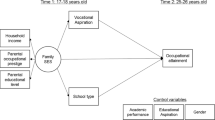Abstract
The impact of the family on the vocational development of youth is critically and systematically examined in this paper. First, the relevant empirical and theoretical literature is identified together with the limitations of that literature, particularly with its failure to consider, a) the ecological influences on career development, b) female career development, and c) the developmental aspects of career choice, entry and maintenance. Second, the paper examines the following family variables in career development; socio-economic status, family process variables, socialization and sex differences, family interactions and family structure. Finally, some implications for guidance and counselling following an individual/environmental perspective are identified.
Similar content being viewed by others
References
Blau, P.M. & Duncan, O.D. (1967). The American occupational structure. New York: Wiley.
Block, J.H. (1979). Another look at sex differentiation in the socialization behaviors of mothers and fathers. In J. Sherman & F.L. Denmark (Eds.), Psychology of Women: Future directions of research.
Block, J.H. (1983). Differential premises arising from differential socialization of the sexes: Some conjectures. Child Development. 54, 1335–1354.
Bronfenbrenner, U. (1977). Toward an experimental ecology of human development. American Psychologist. 32, 513–531.
Bronfenbrenner, U. (1979). The Ecology of Human Development: Experiments by Nature and Design. Cambridge, Mass.: Harvard University Press.
Friessen, J.D. (1985). Structural-Strategic Family Therapy: Training Handbook. New York: Gardner Press.
Gottfredson, L.S. (1982). Vocational research priorities. Counseling Psychologist. 10(2), 69–84
Harvey, M.G. & Kerin, R.A. (1978). The influence of social stratification and age on occupational aspirations of adolescents. Journal of Educational Research. 71, 262–266.
Hoffman, L.W. (1977). Changes in family roles, socialization and sex differences. American Psychologist. 32, 644–657.
Holland, J.L., Magoon, T.M. & Spokane, A.R. (1981). Counseling Psychology: Career interventions, research, and theory. Annual Review of Psychology, 32, 279–305.
Kohn, M.L. (1977). Class and Conformity: A study in values (2nd ed.). Chicago, University of Chicago Press.
Law, B. (1981). Community interaction: A mid-range focus for theories of career development in young adults. British Journal of Guidance and Counselling. 9, 142–158.
Moos, R.H. & Moos, B. (1981). Family Environment Scale Manual. Palo Alto, Calif.: Consulting Psychologists Press.
Mortimer, J.F. (1976). Social class, work and family. Journal of Marriage and the Family, 38, 241–256.
Nye, F.I., Carlson, J. & Garrett, G. (1970). Family size, interactions, affect and stress. Journal of Marriage and the Family. 32, 216–226.
Oppenheimer, U.K. (1974). The life cycle squeeze: the interaction of men's occupational and family life cycle. Demography. 2, 227–246.
Osipow, S.H. (1973). Theories of Career Development. (3rd. ed.). Englewood Cliffs, NJ: Prentice-Hall.
Perun, P.J. & Bielby, D. (1981). Towards a model of female occupational behavior. Psychology of Womens Quarterly. 6, 234–252.
Rehberg, R. & Hotchkiss, L. (1979). Career counseling contemporary U.S. High Schools. Review of Research in Education. 7, 92–150.
Ridgeway, C. (1978). Parental identification and patterns of career orientation in college women. Journal of Vocational Behavior. 12, 1–11.
Roe, A. (1956). The Psychology of Occupations. New York: Wiley.
Schulenberg, J.E., Vondracek, F.W. & Crouter, A.C. (1984). The influence of the family on vocational development. Journal of Marriage and the Family. 46, 129–143.
Seginer, R. (n.d.). Parent's educational expectations and children's academic achievement: Review of the literature and some new research questions. University of Haifa, mimeo.
Sewell, W.H., Haller, A.O. & Portes, A. (1969). The educational and early occupational status attainment process. American Sociological Review. 34, 82–92.
Sewell, W.H., Haller, A.O. & Ohlendorf, G.W. (1970). The education and early occupational status attainment process. Replication and revision. American Sociological Review. 35, 1014–1027.
Super, D.E. (1980). A life span, life space approach to career development. Journal of Vocational Behavior. 16, 282–298.
Vondracek, F.W. & Lerner, R.M. (1982). Vocational role development in adolescence. In B.B. Wolman (Ed.), Handbook of developmental psychology. Englewood Cliffs, NJ: Prentice-Hall.
Weitz, S. (1977). Sex Roles. New York: Oxford University Press.
Young, R.A. (1984). Toward an ecology of career development. Canadian Counsellor. 18, 152–160.
Zajonc, R.B. (1976). Family configuration and intelligence Science. 192, 227–235.
Author information
Authors and Affiliations
Rights and permissions
About this article
Cite this article
Friesen, J. The role of the family in vocational development. Int J Adv Counselling 9, 87–96 (1986). https://doi.org/10.1007/BF00116437
Issue Date:
DOI: https://doi.org/10.1007/BF00116437




